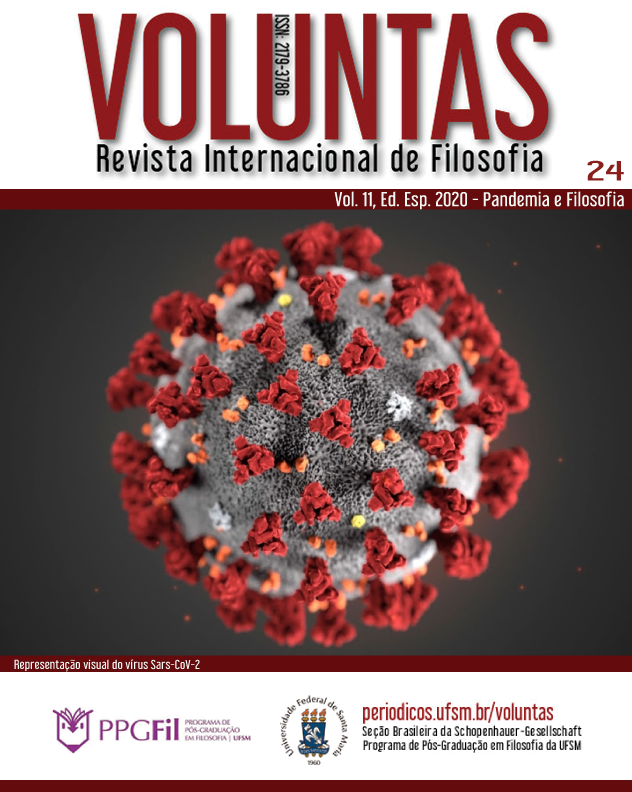Comer Animais e Zoonoses: utilidade da pecuária industrial
DOI:
https://doi.org/10.5902/2179378643987Palavras-chave:
Especismo, COVID-19, Ética, Saúde Pública, UtilitarismoResumo
O objetivo central deste artigo é desenvolver a ideia sobre a utilidade ética da pecuária industrial com ênfase nas doenças zoonóticas a partir do referencial teórico de Peter Singer. Com o aumento da demanda em âmbito global por proteína animal, foram empreendidos novos métodos de manejo que submetem os animais a situações opostas ao bem-estar. Além do mais, essas mudanças são responsáveis pela ascensão das doenças zoonóticas. Desse modo, o presente trabalho trata-se da revisão bibliográfica dos livros Ética Prática e Libertação Animal do Peter Singer e artigos buscados nas plataformas: Scielo, Elsevier e Google Acadêmico. Assim, conclui-se que a pecuária industrial possui uma utilidade duvidosa dentro dos limites da pesquisa porque gera maior desprazer do que prazer.
Downloads
Referências
AL-TAWFIQ, J. A.; ZUMLA, A. Travel implications of emerging coronaviruses: SARS and MERS-CoV. Travel Medicine and Infectious Disease, v. 12, n. 5, p. 422–428, 2014. Disponível em: https://www.ncbi.nlm.nih.gov/pubmed/25047726 Acesso em: 14 abril 2020.
CHAVES, T.; BELLEI, N. SARS-COV-2 , o novo Coronavírus : uma reflexão sobre a Saúde Única (One Health) e a importância da medicina de viagem na emergência de novos patógenos. Revista de Medicina, v. 99, n.1, p. 0–3, 2020. Disponível em: http://www.revistas.usp.br/revistadc/article/view/167173 Acesso em: 14 abril 2020.
EVANS, B. M., GRACZYK, T. K.., SHIFF, C. J., KARREMAN, H. J., PATZ, J. A. Environmental and Geographical Factors Contributing to Watershed Contamination with Cryptosporidium parvum Oocyst. Environmental Research. 2000. Disponível em: <https://www.sciencedirect.com/science/article/abs/pii/S0013935199940227?via%3Dihub Acesso em: 26 abril. 2020.
EVANS, B. M., GRACZYK, T. K.., SHIFF, C. J., NIZEYIMANA, B., PATZ, J. A, Ecology of Zoonotic Cryptosporidiosis in Watersheds Containing Cattle Farming Operations. In: Thompson, R. C. A. et al (Eds.) Cryptosporidium: from molecules to disease. Elsevier B. V., 2003.
MATEUS, E. F. Animais à Mesa: Zoonoses e Estratégias no Consumo de Carne, 2009, 71 p. Dissertação (Mestrado em Antropologia Social e Cultural) – Universidade de Lisboa, Lisboa, PT.
LEIBLER, J. H. et al. Industrial Food Animal Production and Global Health Risks: Exploring the Ecosystems and Economics of Avian Influenza. EcoHealth, 6(1): 58-70 2009. Disponível em doi: 10.1007/s10393-009-0226-0 Acesso em: 13 abril 2020.
RIVERO, Sérgio et al . Pecuária e desmatamento: uma análise das principais causas diretas do
desmatamento na Amazônia. Nova econ., Belo Horizonte , v. 19, n. 1, p. 41-66, abr. 2009 Disponível em https://doi.org/10.1590/S0103-63512009000100003 Acesso em 25 abril 2020
SINGER, P. Libertação Animal. Trad. Mary Wincler. São Paulo. Editora Lugano e Editora Evolução. 2010.
SINGER, P. Practical Ethics. Second Edition. Cambridge University Press. 1993.
ZANELLA, J. Zoonoses emergentes e reemergentes e sua importância para saúde e produção animal. Pesq. agropec. bras., Brasília , v. 51, n. 5, p. 510-519, maio 2016. Disponível em: http://www.scielo.br/scielo.php?script=sci_arttext&pid=S0100204X2016000500510&lng=en&nrm=iso Acesso em: 27 abril 2020.
Downloads
Publicado
Como Citar
Edição
Seção
Licença
Copyright (c) 2020 Voluntas: Revista Internacional de Filosofia

Este trabalho está licenciado sob uma licença Creative Commons Attribution-NonCommercial-ShareAlike 4.0 International License.
A submissão de originais para este periódico implica na transferência, pelos autores, dos direitos de publicação impressa e digital. Os direitos autorais para os artigos publicados são do autor, com direitos do periódico sobre a primeira publicação. Os autores somente poderão utilizar os mesmos resultados em outras publicações indicando claramente este periódico como o meio da publicação original.
A Voluntas é um periódico de acesso aberto sob a licença Creative Commons Atribuição-NãoComercial-CompartilhaIgual 4.0 Internacional (CC BY-NC-SA 4.0).






